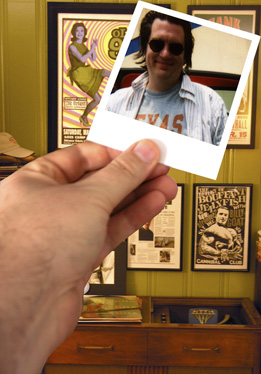Christmas stories are much like the day itself – filled with magic and possibility but ultimately a little disappointing. As a child you wait the whole year for that day and as it inches closer, you anticipation rises until you feel like you will burst by Christmas Eve. Then on Christmas Day, there’s that feeling of … well, not emptiness, but more “Is that it?”
Most Christmas stories are the same way. Unlike old George Bailey or Ebenezer Scrooge, most of us don’t experience a Christmas epiphany that leaves us glad to be alive and thankful for our time.
However, there is one story I know that captures this.
I met Karl King at an SPJ meeting a month or so after I lost my job a few years ago. I meant to do some networking after speaking on this panel about dot-coms and electronic media or something like that. But I already knew most of the people there and none had any job leads, so I ended up talking to this old guy who wanted to talk about his book. He had some interesting stories – he went into the Marines at 14 back in 1939 and ended up in a Japanese POW camp. He went back to school after he retired from years as a broadcaster and earned his Bachelor’s degree in his sixties. I thought I might be able to put together a story about him and sell it, something to pass the time and make a few bucks.
I met Karl at a coffee shop about a week later and spoke with him for two or three hours. And there he told me this story.
He told me many stories about his POW days – surrendering on Corregidor and going for days without food or water, burying the dead who had rotted for days under the merciless sun, beatings, malaria and living in the dark, hot hold of a freighter steaming from the Phillipines to Japan. However, when I asked him if he held any bitterness toward the Japanese about the way he was treated, he said no. Here’s why:
“A Japanese civilian. Mr. Miamoto, that I had worked under on several occasions, motioned for me to follow him. He led me to a corner of the shop behind some boxes. The little man had straight black hair and small moustache. His demeanor and body language reminded me of Charlie Chaplin without a cane. Squatting down on his haunches he wrote a little message using a piece of chalk. “12-24-42,” he wrote. Then he drew a Christian cross and box with a ribbon bow on top. With sign language and pointing to his writing on the shop floor, he had me understand that he was aware of our custom of giving a gift a Christmas time. With that, he produced a small paper sack and pressed into my hands his Christmas gift. It was a sack with about a teaspoon full of sugar. Mr. Miamoto indicated to me that I didn’t have to give anything in return. Back at camp that evening I heard several POWs recounting similar experiences, receiving gifts from cigarettes to candy. I later learned that Mr. Miamoto’s gift was his entire December ration of sugar.”
Karl explained that when people ask him if he was bitter because of the way he was treated by the Japanese, he would say no. He knew groups are capable of terrible things, but individuals like Mr. Miamoto were capable of great kindness.
Karl’s lack of bitterness is humbling. I’ve known people who have suffered far less and nurtured their anger and resentment far more. But not Karl. Instead he quotes Emerson’s essay on self-reliance. He doesn’t look at his life in terms of bad things that have happened to him, but instead in terms of his own strength and determination to overcome adversity. That is what I take from this Christmas story: many times you get what you are looking for out of life. We should all have the courage to find the joy and happiness in this word.
Merry Christmas.
Monday, December 26, 2005
A Christmas story
Subscribe to:
Post Comments (Atom)

No comments:
Post a Comment